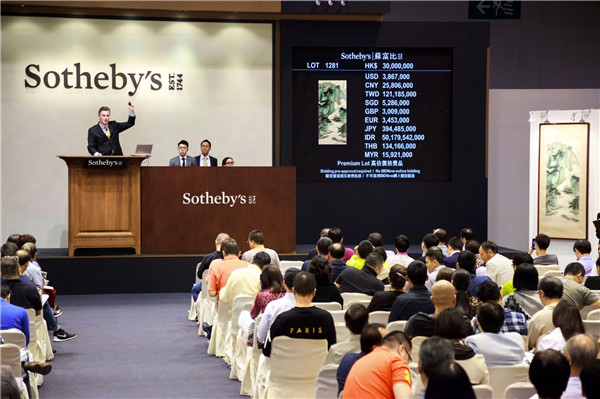 |
|
An auction of Chinese paintings was held during Sotheby's major autumn sales in Hong Kong last year. [Photo provided to China Daily] |
Rapid expansion
The three Chinese art brokers are no more than 25 years old. Guardian, the oldest, was established in 1993 and hosted the mainland's first art auction. Its business has expanded rapidly during the past two decades.
Ji, the art observer in Beijing, said domestic auction houses mainly cater to Chinese people at home and abroad. Moreover, the buyers and the sources from which auction houses find objects to sell are mostly Chinese.
"It will take a long time for local houses to build an international, competitive brand," he said.
International houses have also flourished in online auctions, which have been well received by the younger generation of collectors, including those from China. While the Chinese market hasn't seen a boom in online auctions because few houses offer regular sales, Christie's noted that buyers from China accounted for 90 percent of their online sales of Chinese paintings. Following the success of an online sale of Chinese ceramics from the collection of the Metropolitan Museum of Art last year, Christie's is hoping for another stellar performance as demand for highly decorated porcelain in the Asian markets continues to grow.
"Quality and provenance are always important to our clients and attract international buyers to our online sales, as they do our live auctions," said Samantha Phillips, Christie's global head of online sales of Asian arts.
The insatiable appetite of Chinese buyers doesn't stop at Asian art. The auction house Fellows, which specializes in jewelry and watches but has the occasional Asian artwork on the block, has seen a 30 to 40 percent increase in Chinese clients in the last 12 months.
"Chinese buyers are more determined than their European counterparts," said Stephen Whittaker, the managing director. "For Asian art pieces, for example, I think Chinese bidders are culturally more attached to them."